Unit 4 My day 汉译英 专练(含解析)牛津译林版英语七年级上册
文档属性
| 名称 | Unit 4 My day 汉译英 专练(含解析)牛津译林版英语七年级上册 | 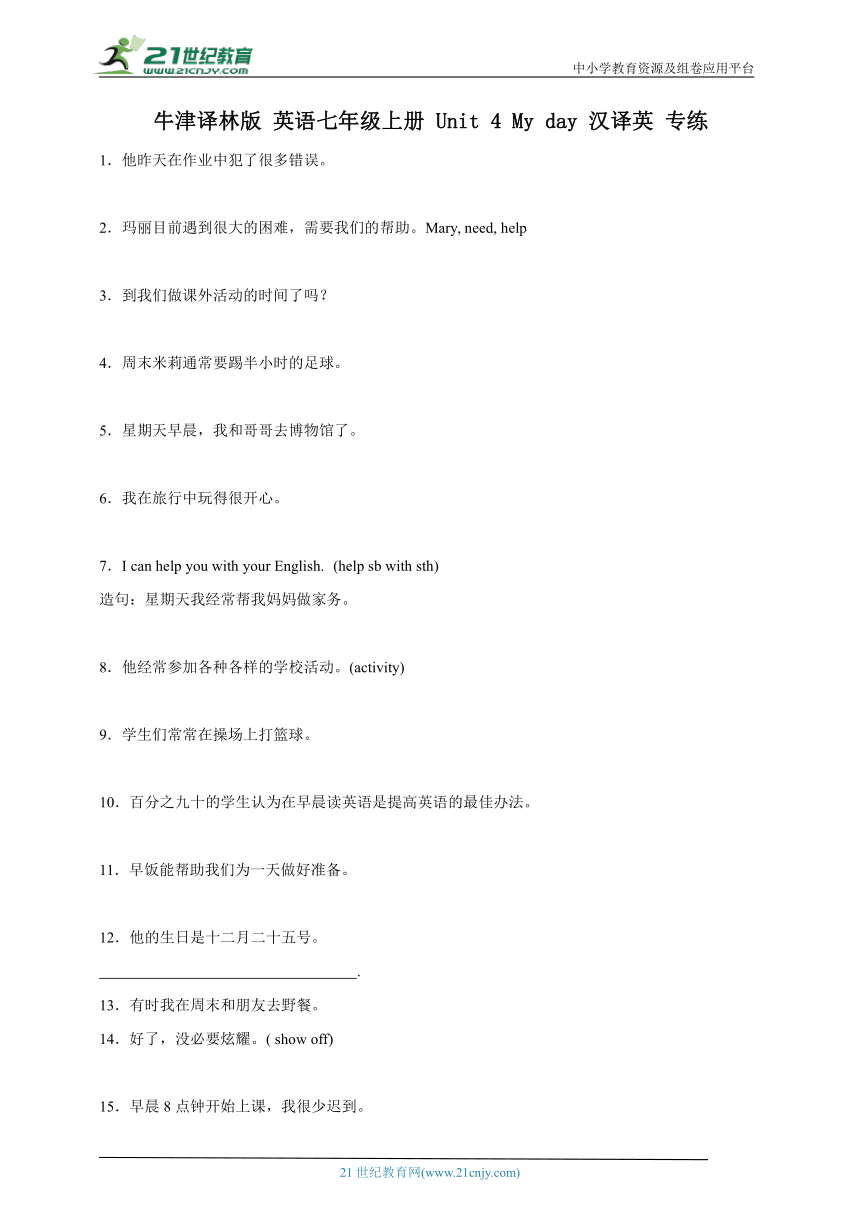 | |
| 格式 | docx | ||
| 文件大小 | 286.9KB | ||
| 资源类型 | 试卷 | ||
| 版本资源 | 牛津译林版 | ||
| 科目 | 英语 | ||
| 更新时间 | 2023-09-19 16:04:42 | ||
图片预览

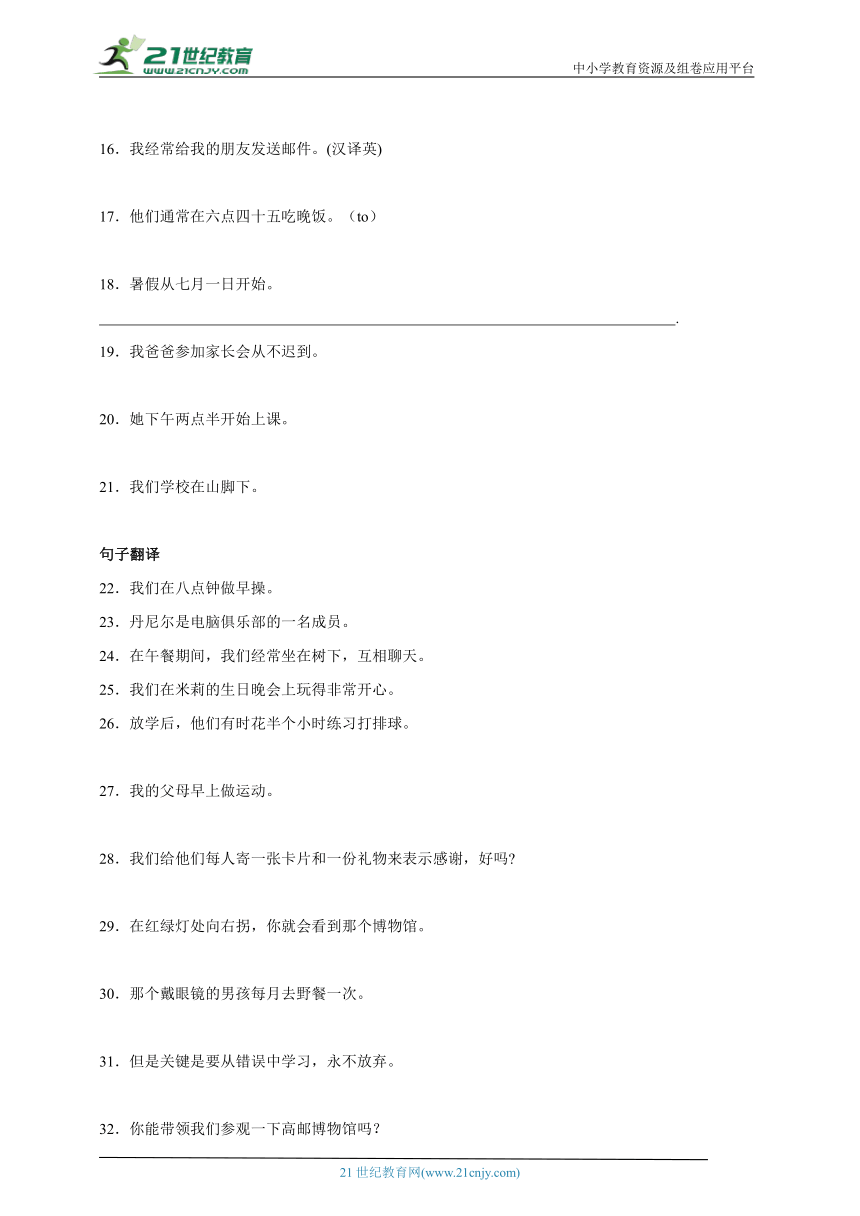
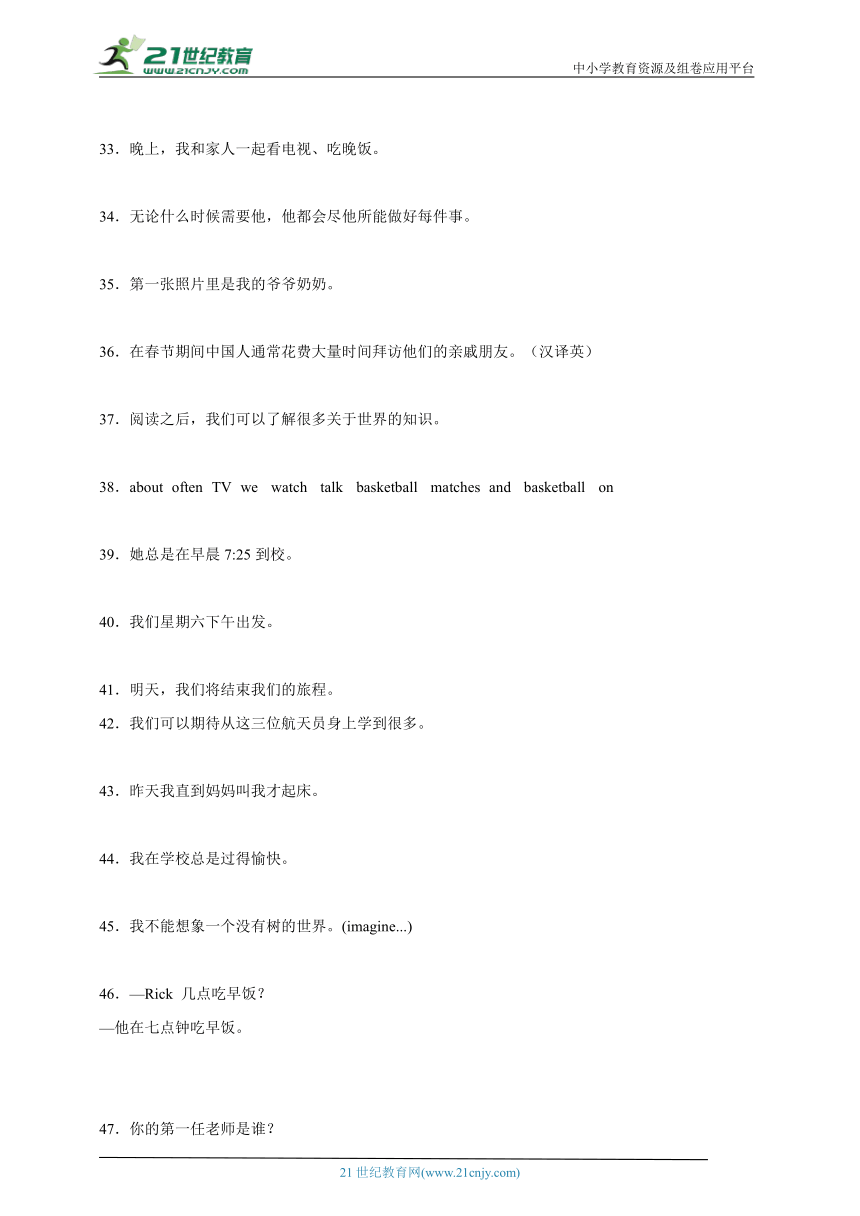
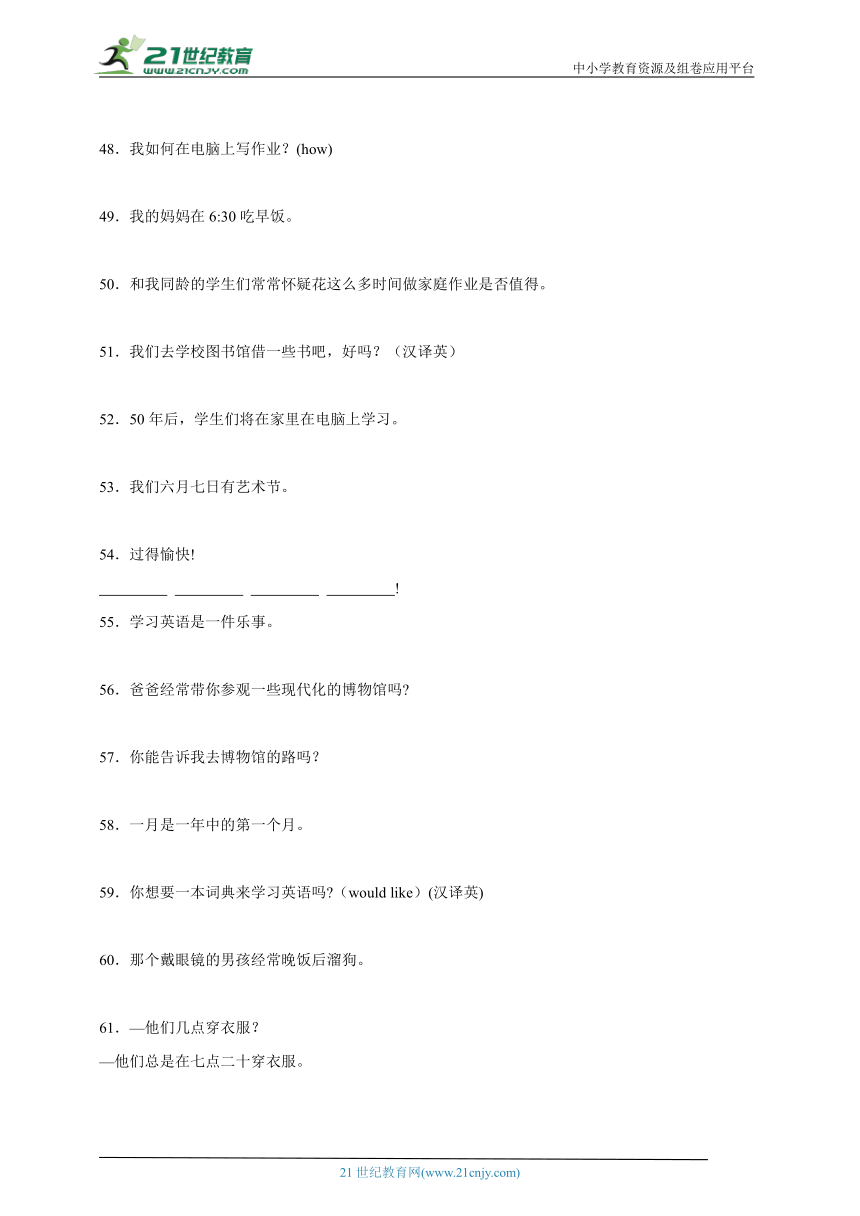
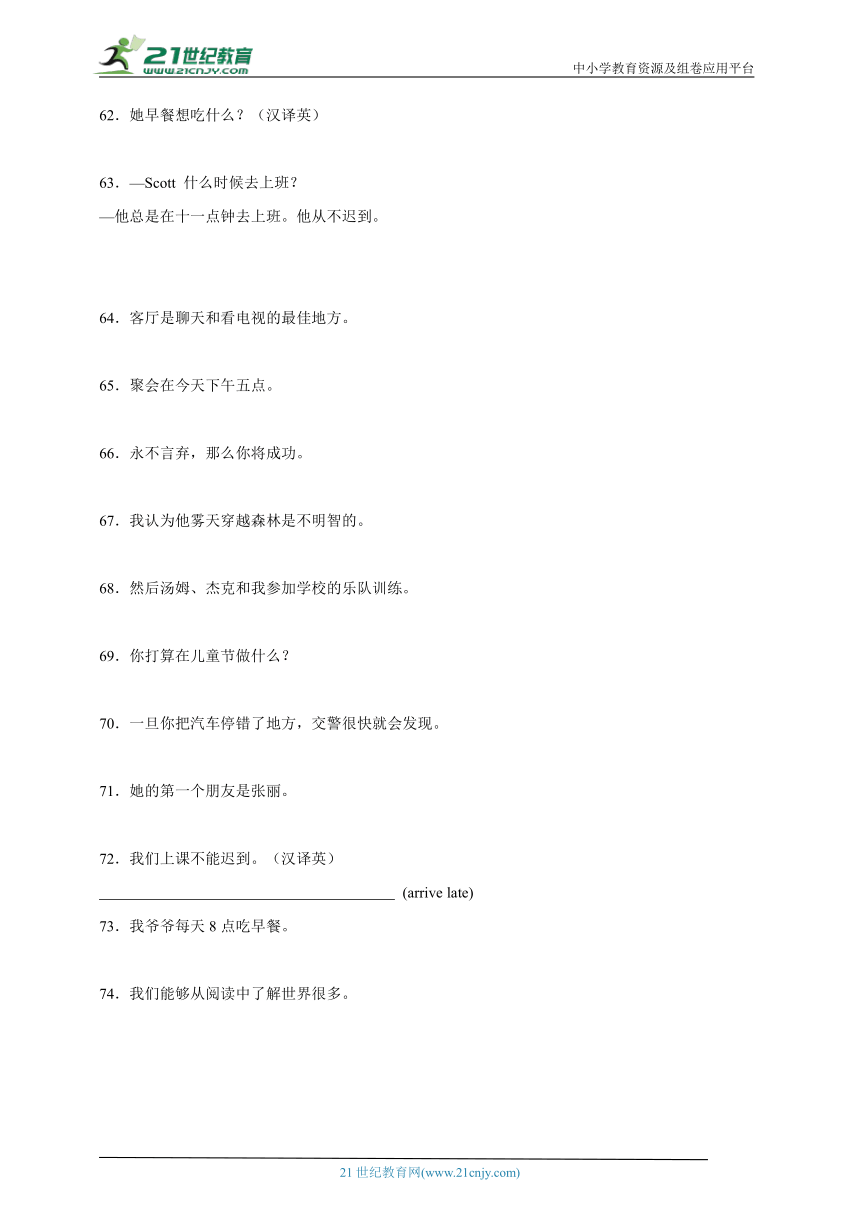
文档简介
中小学教育资源及组卷应用平台
牛津译林版 英语七年级上册 Unit 4 My day 汉译英 专练
1.他昨天在作业中犯了很多错误。
2.玛丽目前遇到很大的困难,需要我们的帮助。Mary, need, help
3.到我们做课外活动的时间了吗?
4.周末米莉通常要踢半小时的足球。
5.星期天早晨,我和哥哥去博物馆了。
6.我在旅行中玩得很开心。
7.I can help you with your English. (help sb with sth)
造句:星期天我经常帮我妈妈做家务。
8.他经常参加各种各样的学校活动。(activity)
9.学生们常常在操场上打篮球。
10.百分之九十的学生认为在早晨读英语是提高英语的最佳办法。
11.早饭能帮助我们为一天做好准备。
12.他的生日是十二月二十五号。
.
13.有时我在周末和朋友去野餐。
14.好了,没必要炫耀。( show off)
15.早晨8点钟开始上课,我很少迟到。
16.我经常给我的朋友发送邮件。(汉译英)
17.他们通常在六点四十五吃晚饭。(to)
18.暑假从七月一日开始。
.
19.我爸爸参加家长会从不迟到。
20.她下午两点半开始上课。
21.我们学校在山脚下。
句子翻译
22.我们在八点钟做早操。
23.丹尼尔是电脑俱乐部的一名成员。
24.在午餐期间,我们经常坐在树下,互相聊天。
25.我们在米莉的生日晚会上玩得非常开心。
26.放学后,他们有时花半个小时练习打排球。
27.我的父母早上做运动。
28.我们给他们每人寄一张卡片和一份礼物来表示感谢,好吗
29.在红绿灯处向右拐,你就会看到那个博物馆。
30.那个戴眼镜的男孩每月去野餐一次。
31.但是关键是要从错误中学习,永不放弃。
32.你能带领我们参观一下高邮博物馆吗?
33.晚上,我和家人一起看电视、吃晚饭。
34.无论什么时候需要他,他都会尽他所能做好每件事。
35.第一张照片里是我的爷爷奶奶。
36.在春节期间中国人通常花费大量时间拜访他们的亲戚朋友。(汉译英)
37.阅读之后,我们可以了解很多关于世界的知识。
38.about often TV we watch talk basketball matches and basketball on
39.她总是在早晨7:25到校。
40.我们星期六下午出发。
41.明天,我们将结束我们的旅程。
42.我们可以期待从这三位航天员身上学到很多。
43.昨天我直到妈妈叫我才起床。
44.我在学校总是过得愉快。
45.我不能想象一个没有树的世界。(imagine...)
46.—Rick 几点吃早饭?
—他在七点钟吃早饭。
47.你的第一任老师是谁?
48.我如何在电脑上写作业?(how)
49.我的妈妈在6:30吃早饭。
50.和我同龄的学生们常常怀疑花这么多时间做家庭作业是否值得。
51.我们去学校图书馆借一些书吧,好吗?(汉译英)
52.50年后,学生们将在家里在电脑上学习。
53.我们六月七日有艺术节。
54.过得愉快!
!
55.学习英语是一件乐事。
56.爸爸经常带你参观一些现代化的博物馆吗
57.你能告诉我去博物馆的路吗?
58.一月是一年中的第一个月。
59.你想要一本词典来学习英语吗 (would like)(汉译英)
60.那个戴眼镜的男孩经常晚饭后溜狗。
61.—他们几点穿衣服?
—他们总是在七点二十穿衣服。
62.她早餐想吃什么?(汉译英)
63.—Scott 什么时候去上班?
—他总是在十一点钟去上班。他从不迟到。
64.客厅是聊天和看电视的最佳地方。
65.聚会在今天下午五点。
66.永不言弃,那么你将成功。
67.我认为他雾天穿越森林是不明智的。
68.然后汤姆、杰克和我参加学校的乐队训练。
69.你打算在儿童节做什么?
70.一旦你把汽车停错了地方,交警很快就会发现。
71.她的第一个朋友是张丽。
72.我们上课不能迟到。(汉译英)
(arrive late)
73.我爷爷每天8点吃早餐。
74.我们能够从阅读中了解世界很多。
参考答案:
1.He made many mistakes in his homework yesterday.
【详解】根据汉语可知,本句时态是一般过去时;他:he,在句中作主语;犯了很多错误:make many mistakes,make的过去式made;在他的作业中:in his homework,昨天:yesterday,在句中作时间状语。故填He made many mistakes in his homework yesterday.
2.Mary is in great trouble now, and she needs our help.
【详解】be in great trouble处于极大的困难中;由“目前”可知,句子使用一般现在时。玛丽目前遇到很大的困难可表示为“Mary is in great trouble now”。need是动词需要,need our help需要我们的帮助,主语是可用单数第三人称she代替,谓语动词用单数第三人称形式。故填Mary is in great trouble now, and she needs our help.
3.Is it time for us to do after-school activities
【详解】根据汉语提示可知此句为一般疑问句,时态为一般现在时。“到某人做某事的时间了”用句型“It is time for sb to do sth”,一般疑问句应将be动词“is”提前,首字母大写;“某人”是“我们”,位于“for”后面应用宾格“us”;“做某事”是“做课外活动”,译为“do after-school activities”。故填Is it time for us to do after-school activities
4.Millie usually plays football for half an hour at the weekend.
【详解】at the weekend“周末”,用于一般现在时;Millie“米莉”;usually“通常”;play football“踢足球”;for half an hour“半小时”。主语Millie是第三人称单数,动词需用三单形式。故填Millie usually plays football for half an hour at the weekend.
5.On Sunday morning, my brother and I went to the museum.
【详解】星期天早晨:on Sunday morning,此处句子用一般过去时;主语是my brother and I;去博物馆:go to the museum。go的过去式是went。故填On Sunday morning, my brother and I went to the museum.
6.I had a good time on the trip.
【详解】I“我”;have a good time“玩得开心”,是固定搭配;on the trip“在旅行中”。根据句意可知,这是发生在过去的事情,应用一般过去时。故填I had a good time on the trip.
7.I usually help my mother with the housework on Sundays.
【详解】help sb with sth“帮助某人做某事”,是固定搭配;usually“通常”,放在实义动词前;句子用一般现在时,主语I是第一人称,动词用原形;my mother“我妈妈”;the housework“家务”;on Sundays“在星期天”,故填I usually help my mother with the housework on Sundays.
8.He often takes part in all kinds of school activities.
【详解】根据题干可知,本句是一般现在时。he“他”作主语;often“经常”,频度副词位于实义动词之前;take part in“参加”,此处需用三单形式takes;all kinds of school activities“各种各样的学校活动”,作介词in的宾语。故填He often takes part in all kinds of school activities.
9.The students usually play basketball on the playground.
【详解】students“学生们”;usually“通常”;play basketball“打篮球”;on the playground“在操场上”。故填The students usually play basketball on the playground.
10.Ninety percent of the students think reading English in the morning is the best way to improve English.
【详解】百分之九十的学生ninety percent of the students;认为think,其后加宾语从句;在早晨读英语read English in the morning,在从句中作主语,用动名词形式;提高英语的最佳办法the best way to improve English。故填Ninety percent of the students think reading English in the morning is the best way to improve English.
11.Breakfast can help me get ready for the day.
【详解】早饭:breakfast;能够:can,情态动词后加动词原形help“帮助”;帮助某人做某事:help sb. do sth.;为一天做好准备:get ready for the day。故填Breakfast can help me get ready for the day.
12.His birthday is on December 25th
【详解】他的:his;生日:birthday;在具体某一天用介词on;十二月二十五号:December 25th;句子主语是his birthday,是单数,且句子表达的是客观事实,时态用一般现在时,故谓语动词用is。故填His birthday is on December 25th.
13.Sometimes I go on a picnic/picnics with friends at weekends.
【详解】句意:有时我在周末和朋友去野餐。根据go on a picnic /picnics 去野餐, at weekends在周末;故答案是Sometimes I go on a picnic/picnics with friends at weekends。
14.All right, there’s no need to show off.
【详解】句意:好了,没必要炫耀。根据 need to do sth需要做某事,show off炫耀.;故答案是All right, there's no need to show off.
15.Classes start/begin at 8 a.m., and I am seldom late.
【详解】classes“课”,复数名词,表示泛指,作主语,谓语动词用原形,start/begin“开始”,at 8 a.m.“在早上八点”,具体的钟点前用介词at,I“我”,作主语,seldom“很少”,副词,be late“迟到”,主语是I,be动词用am,两个简单句用and连接。故填Classes start/begin at 8 a.m., and I am seldom late.
16.I often send emails to my friend(s).
【详解】“我”I,作主语;“经常”often,频度副词,置于主谓之间;“给某人发送邮件”send emails to sb.;“我的朋友”my friend(s)。结合“经常”可知用一般现在时,主语“I”谓语用动词原形。故填I often send emails to my friend(s).
17.They usually have dinner at twenty to seven.
【详解】usually“通常”,放在实义动词前;have dinner“吃晚饭”;六点四十就是差二十分到七点,英文表达为twenty to seven,句子是一般现在时,主语they是复数形式,动词用原形,故填They usually have dinner at twenty to seven.
18.The summer holiday starts from the first of July
【详解】暑假:summer holiday;开始:start;从七月一日:from the first of July。由语境可知,本句表达的是事实,时态为一般现在时,主语“暑假”是特指,需要用定冠词the,主语是单数,谓语动词使用三单形式,故填The summer holiday starts from the first of July。
19.My father is never late for the parents’ meeting.
【详解】我爸爸:my father;迟到:be late for;家长会:the parents’ meeting;从不:never。根据句意可知句子时态为一般现在时。主语my father是单数,因此be动词用is。故填My father is never late for the parents’ meeting.
20.She starts her lesson at half past two in the afternoon.
【详解】句子陈述一般事实,时态用一般现在时,主语是she“她”,位于句首,首字母要大写;“开始上课”start her lesson,主语是第三人称单数,谓语动词也要用第三人称单数starts;“下午两点半”half past two in the afternoon,表示在几点用介词at;故填She starts her lesson at half past two in the afternoon.
21.Our school is at the foot of the hill.
【详解】我们学校our school;在山脚下at the foot of the hill。本句是主系表结构,our school是单数第三人称,系词需用is;根据句意结构,可知填Our school is at the foot of the hill.。
22.We do morning exercises at eight. 23.Daniel is a member of the Computer Club. 24.We often sit under the tree and chat with each other at lunchtime. 25.We have/had a good time at Millie’s birthday party. 26.Sometimes it takes them half an hour to practice playing volleyball after school.
【解析】22.do morning exercises做早操;at eight在8点钟。时态为一般现在时,主语为we,故答案为We do morning exercises at eight.
23.be a member of 是……中的一员,时态为一般现在时,主语为Daniel,be动词要用is,故答案为Daniel is a member of the Computer Club.
24.under the tree在树下;chat with each other相互聊天; at lunchtime在午餐时间。根据often判断,句子的时态为一般现在时,主语是we,故答案为We often sit under the tree and chat with each other at lunchtime.
25.have a good time玩的开心,过的愉快。因为没有具体的时间状语,时态为一般现在时或一般过去时都可以,故答案为We have/had a good time at Millie’s birthday party.
26.It takes sb. some time to do sth.花费某人多长时间做某事;practice doing sth.练习做某事;根据频率副词sometimes判断,句子的时态为一般现在时态,故答案为Sometimes it takes them half an hour to practice playing volleyball after school.
27.My parents play sports in the morning.
【详解】我的父母my parents,复数名词作主语;在早上in the morning;做运动play sports,主语是复数,动词用原形,故填My parents play sports in the morning.
28.Shall we get each of them a card and gift to say thank you
【详解】根据句意可知,此句是一个表示请求、建议的句型,因此用“Shall we do sth. ”。谓语动词:get ... a card and gift;他们每人:each of them;来表示感谢:to say thank you,作目的状语。故填Shall we get each of them a card and gift to say thank you
29.Turn right at the traffic lights, and you will see that museum.
【详解】右拐:turn right;在红绿灯处: at the traffic lights;看到那个博物馆:see that museum。根据句意可知,需要运用到“祈使句,and / or + 一般将来时”的固定句型,前后两句话是顺承关系,因此用连词and;will后面用动词原形see。故填Turn right at the traffic lights, and you will see that museum.
30.The boy with/wearing glasses goes on a picnic/picnics once a month.
【详解】那个戴眼镜的男孩:The boy with/wearing glasses;去野餐:go on a picnic/picnics;每月一次:once a month。根据“once a month”可知句子是一般现在时,主语the boy是单数名词,谓语动词用单三形式。故填The boy with/wearing glasses goes on a picnic/picnics once a month.
31.But the key is to learn from your mistakes and never give up.
【详解】但是but;关键是the key is;要从错误中学习to learn from your mistakes,动词不定式作表语;永不放弃never give up;and连接并列句。故填But the key is to learn from your mistakes and never give up.
32.Can you show us around Gaoyou Museum
【详解】由句意知此句为一般疑问句,Can you do sth.“你能做某事吗”,表示请求,此句用can引导的一般疑问句;“带领某人参观”show sb. around;“我们”us,宾格,show us around“带领我们参观”;“高邮博物馆”Gaoyou Museum。故填Can you show us around Gaoyou Museum
33.In the evening, I watch TV and have dinner with my family.
【详解】分析语境可知,此处使用一般现在时,说明经常发生的情况;in the evening“晚上”;I“我”;watch TV“看电视”;and表示并列;have dinner“吃晚饭”;with“和”,介词;my family“我的家人”。故填In the evening, I watch TV and have dinner with my family.
34.He will do his best to do everything well whenever he is needed.
【详解】短语do one’s best to do sth.表示尽某人最大努力去做某事;这里是一般将来时,will+动词的原形;主语是he,这里的one’s用his;do everything well表示做一切好的事情;whenever he is needed表示无论何时他需要。根据汉语提示,故填He will do his best to do everything well whenever he is needed.
35.My grandfather and grandmother are in the first photo./My grandparents are in the first photo./My grandfather and grandmother are in the first picture./My grandparents are in the first picture.
【详解】“我的爷爷奶奶”my grandfather and grandmother或my grandparents;“第一张照片”the first photo/picture。结合语境可知该句为一般现在时。主语为my grandfather and grandmother或my grandparents,是复数,所以be动词用are。故填My grandfather and grandmother are in the first photo./My grandparents are in the first photo./My grandfather and grandmother are in the first picture./My grandparents are in the first picture.
36.People usually spend a lot of time visiting their relatives and friends during the Spring Festival.
【详解】在春节期间:during the Spring Festival;人们:people;通常:usually;花费时间做某事:spend time doing sth.;大量时间:a lot of time;拜访他们的亲戚朋友:visit their relatives and friends。故填People usually spend a lot of time visiting their relatives and friends during the Spring Festival.
37.After reading, we can know a lot about the world.
【详解】阅读:read;在……之后:after;我们:we;可以:can;了解很多:know a lot;关于世界的知识:about the world。介词after后跟动词read,动词要用动名词的形式,构成介宾短语作状语,即after reading;情态动词can后跟动词原形。故填After reading, we can know a lot about the world.
38.We often talk about basketball and watch basketball matches on TV.
【详解】句子主语是“we 我们”,句子谓语是“watch 观看”和“talk about 谈论”,由于句子主语只有一个,但谓语动词有两个,所以用and连接两个谓语动词;“basketball 篮球”和“basketball matches 篮球比赛”都作宾语,放到对应的谓语动词之后;“on TV 在电视上”,作状语,一般放句末;“often 经常”是频率副词,放主语之后,谓语动词之前,故填We often talk about basketball and watch basketball matches on TV.
39.She always arrives at school at 7:25 a.m..
【详解】she“她”,主格作主语;always“总是”,频度副词,也是一般现在时的标志词,arrive at school“到达学校”,主语是第三人称单数形式,动词用三单形式,at 7:25 a.m.“在早晨7:25”,具体的钟点前用介词at,故填She always arrives at school at 7:25 a.m..
40.We’ll start on Saturday afternoon.
【详解】根据句意可知,此句是一般将来时态的肯定陈述句。此句故翻译为We’ll start on Saturday afternoon.
41.Tomorrow, we will (shall) end our journey/ Tomorrow, we are going to end our journey
【详解】明天:tomorrow;我们:we;结束我们的旅程:end our journey。根据语境(tomorrow)可知,此题为一般将来时,其结构为be going to/will (shall) do sth.,主语we是复数,因此be用are。故填Tomorrow, we will (shall) end our journey/ Tomorrow, we are going to end our journey。
42.We can expect to learn a lot from the three astronauts.
【详解】we“我们”;can“可以”,情态动词,其后接动词原形;expect to do sth.“期待做某事”,不定式作宾语;learn a ot“学到很多”;from the three astronauts“从这三位航天员身上”。故填We can expect to learn a lot from the three astronauts.
43.I didn’t get up until my mom woke me up yesterday./Yesterday I didn’t get up until my mom woke me up.
【详解】yesterday昨天,句子时态是一般过去时;I作主语;get up起床;not…until直到……才;my mom我妈妈;woke me up叫醒我。故填I didn’t get up until my mom woke me up yesterday./Yesterday I didn’t get up until my mom woke me up.
44.I always have a good time at school.
【详解】I“我”;always“总是”;have a good time“过得愉快”;at school“在学校”,此句是一般现在时,主语I是第一人称,动词用原形,故填I always have a good time at school.
45.I can’t imagine a world without trees.
【详解】I“我”;can’t“不能”,后加动词原形;imagine“想象”;a world“一个世界”;without trees“没有树”。故填I can’t imagine a world without trees.
46. What time does Rick eat breakfast He eats breakfast at seven o' clock.
【详解】分析句子可知是特殊疑问句,“几点”在英文中表达为“what time”,“吃早饭”在英文中表达为“eat breakfast”,“七点钟”在英文中表达为“at seven o' clock”,答句主语是“he”,谓语动词应用动词三单,故填What time does Rick eat breakfast He eats breakfast at seven o' clock.
47.Who was your first teacher
【详解】这是一个特殊疑问句,疑问词应用who“谁”;first teacher“第一任老师”,your“你的”。根据句意可知,该句应用一般过去时态,be动词用was。故答案为Who was your first teacher
48.How do I write my homework on the computer
【详解】根据提示词和标点符号可知,本句是How引导的特殊疑问句。How“如何”;I“我”,时态是一般现在时,因此借助do构成疑问句,do后跟动词原形write“写”;my homework“我的家庭作业”;on the computer“在电脑上”。故填How do I write my homework on the computer
49.My mother has breakfast at 6:30 a.m.
【详解】我的妈妈:my mother,句首单词首字母要大写;吃早饭:have breakfast,此句时态为一般现在时,主语my mother为第三人称单数,故动词用其三单形式has;在6:30:at 6:30 a.m.,时间状语置于句末。故填My mother has breakfast at 6:30 a.m.
50.The students of my age often doubt whether it is worth spending so much time on homework.
【详解】the students of my age表示我同龄的学生们;这里是whether引导的宾语从句;短语be worth doing sth.表示值得做某事;短语spend+时间+on sth.表示花费时间做某事;根据汉语提示,故填The students of my age often doubt whether it is worth spending so much time on homework.
51.Shall we go to the school library and borrow some books
【详解】我们去做某事好吗:shall we do sth.;去学校图书馆:go to the school library;借一些书:borrow some books,此处是希望得到肯定回答的疑问句,用some表示“一些”;两个动作表示并列,用and连接。故填Shall we go to the school library and borrow some books
52. In 50 years, students will study at home on computers.
【详解】根据句意可知,这句话表示将来的事情,应使用一般将来时will+动词原形,主语为students学生们;study at home在家学习;on computers在电脑上。in在一般将来时中表示“在…之后”,后面跟一段时间。故填In 50 years, students will study at home on computers.
53.We have an art Festival on June 7th.
【详解】we“我们”;have“有”,主语是第一人称,动词用原形;an art Festival“一个艺术节”;on June 7th“在六月七日”。故填We have an art Festival on June 7th.
54. Have a good time
【详解】这是祈使句,直接动词原形放句首。表达“过得愉快”用短语“have a good time”。句首首字母大写。故填Have;a;good;time。
55.Learning English is great fun./It is fun to learn English.
【详解】根据汉语句意,可知句子是主系表结构;“学习英语”learn English,因其在句首作主语因此用动名词形式learning,且首字母要大写,动名词短语作主语,be动词用is;“乐事”great fun;该句也可以用固定句型:It is+形容词或名词+to do sth.意为“做某事怎么样”,其中it作形式主语,代替后面的不定式to do sth.(真正主语)。故填Learning English is great fun./It is fun to learn English.
56.Does your father often show you around some modern museums
【详解】根据题干可知本句为一般现在时的一般疑问句;your father“你爸爸”在句中作主语;“经常”often;带领某人参观……”show sb around,本句为一般疑问句,show为实义动词,主语为第三人称单数,因此一般疑问句需要借助于助动词does,且首字母要大写;“一些现代化的博物馆” some modern museums;故填Does your father often show you around some modern museums
57.Can you tell me the way to the museum
【详解】本句为一般疑问句。can表示能力,一般疑问句时提到句首,Can you tell me你能告诉我,the way to the museum去博物馆的路。故填Can you tell me the way to the museum
58.January is the first month of a year.
【详解】January“一月”,作主语;is“是”,系动词;the first month of a year“一年中的第一个月”,作表语。故填January is the first month of a year.
59.Would you like a dictionary for learning English
【详解】想要……:would like sth,疑问句把would提到主语you前面;一本词典a dictionary,名词作宾语;学习英语learn English,此处应用介词for,表示“为了学习英语”,故填Would you like a dictionary for learning English
60.The boy with/wearing glasses often walks the dog after supper/dinner. 或The boy with/wearing glasses often takes the dog for a walk after supper/dinner.
【详解】那个男孩:the boy;戴眼镜的:with/wearing glasses;经常:often;在晚饭后:after supper/dinner;遛狗:walk the dog/take the dog for a walk。结合语境可知,句子时态为一般现在时。此处“戴眼镜的”修饰“那个男孩”,要放在其后作后置定语,the boy中首字母t要大写,由于句子主语是“那个男孩”,为第三人称单数,故谓语动词“遛狗”要用三单形式,即walks the dog或takes the dog for a walk,“在晚饭后”为时间状语,放于句末,“经常”表频率,放在谓语动词前。故填The boy with/wearing glasses often walks the dog after supper/dinner. 或The boy with/wearing glasses often takes the dog for a walk after supper/dinner.
61. —What time do they get dressed —They always get dressed at seven twenty.
【详解】询问“几点”用What time ;穿衣服:get dressed;七点二十:seven twenty。根据汉语句子,考查特殊疑问词“几点”What time;“总是”always和在具体时间点前的介词at的用法。主语为they,疑问句要引入助动词do。故填:①—What time do they get dressed ②—They always get dressed at seven twenty.
62.What would she like for breakfast
【详解】根据汉语可知,本句是what“什么”引导的特殊疑问句,“她”she;“想要”would like;“早餐吃……”for breakfast。故填What would she like for breakfast
63. —When does Scott go to work —He always goes to work at eleven o' dock. He's never late.
【详解】根据语境可知,时态是一般现在时,问句是when“什么时候”引导的特殊疑问句(疑问词+助动词+主语+动词原形+其他?),主语是Scott,助动词用does,去上班: go to work;答句中主语是he“他”,动词用三单形式,总是:always,十一点钟:at eleven o' clock,置于句尾;从不:never,迟到:be late,主语是he,be动词用is。故填:—When does Scott go to work ;—He always goes to work at eleven o' clock. He's never late.
64.Living room is the best place to chat and watch TV.
【详解】客厅:Living room;最佳地方:the best place;聊天和看电视:chat and watch TV。是:is。本句是主系表结构,the best place to do sth“最佳的做某事的地方”。故填Living room is the best place to chat and watch TV.
65.The party is at five this afternoon.
【详解】聚会:the party;在今天下午五点:at five this afternoon。按计划/时间发生的动作,用一般现在时态,the party是单数,所以be动词用is,句子开头首字母大写。故填The party is at five this afternoon.
66.Never give up, and you will succeed/be successful.
【详解】分析句子,该句为“祈使句+and+陈述句”,祈使句为“否定词+动词原形”,陈述句为一般将来时“will do”,“永不言弃”为never give up,“成功”为succeed/be successful,故填Never give up, and you will succeed/be successful.
67.I don’t think it is wise of him to walk through the forest on foggy days.
【详解】根据题干,可知考查:I don’t think+宾语从句,属于否定前移;it is wise of sb. to do sth.“某人做某事是明智的”;穿越森林:walk through the forest ;在多雾的日子:on foggy days。由句意可知时态是一般现在时。故填I don’t think it is wise of him to walk through the forest on foggy days.
68.Then Tom, Jack and I take part in the school band practice.
【详解】then“然后”;Tom, Jack and I“汤姆、杰克和我”;take part in“参加”;the school band practice“学校的乐队训练”。结合语境可知,此题为一般现在时,主语“Tom, Jack and I”为复数,谓语动词take应用原形。故填Then Tom, Jack and I take part in the school band practice.
69.What are you going to do on Children's Day
【详解】这是一个特殊疑问句,疑问词用What;主语为you,根据句意可知,这句话表示将来的动作,应用一般将来时。be going to表示“打算做……”,后跟动词原形;Children’s Day儿童节,前应用介词on。故填What are you going to do on Children’s Day
70.Once you park your car in the wrong place, a traffic policeman will soon find it.
【详解】once“一旦”,引导条件状语从句,遵循“主将从现”;park your car“停车”;in the wrong place“在错误的地方”;a traffic policeman“交警”;soon find“很快发现”,故填Once you park your car in the wrong place, a traffic policeman will soon find it.
71.Her first friend is Zhang Li.
【详解】Her first friend她的第一个朋友,is是,Zhang Li张丽。故填Her first friend is Zhang Li.
72.We can’t arrive/be late for class.
【详解】arrive/be late for class“上课迟到”,can’t“不能”,后接动词原形,故填We can’t arrive/be late for class.
73.My grandfather has breakfast at 8 every day.
【详解】我爷爷:my grandfather;吃早餐:have breakfast;八点钟:at 8;每天:every day。分析句子可知,句子是一般现在时。主语my grandfather是第三人称单数,故have用三单has,时间状语位于句末。故填My grandfather has breakfast at 8 every day.
74.We can learn a lot about the world from reading.
【详解】我们:we,人称代词主格,作主语;能够:can,情态动词,后接动词原形;从阅读中了解世界很多:learn a lot about the world from reading,其中a lot是副词修饰动词learn,此处的动词要用原形,about介词,表示“关于”,from表示“从……”,后接动名词形式;故填We can learn a lot about the world from reading.
21世纪教育网 www.21cnjy.com 精品试卷·第 2 页 (共 2 页)
21世纪教育网(www.21cnjy.com)
牛津译林版 英语七年级上册 Unit 4 My day 汉译英 专练
1.他昨天在作业中犯了很多错误。
2.玛丽目前遇到很大的困难,需要我们的帮助。Mary, need, help
3.到我们做课外活动的时间了吗?
4.周末米莉通常要踢半小时的足球。
5.星期天早晨,我和哥哥去博物馆了。
6.我在旅行中玩得很开心。
7.I can help you with your English. (help sb with sth)
造句:星期天我经常帮我妈妈做家务。
8.他经常参加各种各样的学校活动。(activity)
9.学生们常常在操场上打篮球。
10.百分之九十的学生认为在早晨读英语是提高英语的最佳办法。
11.早饭能帮助我们为一天做好准备。
12.他的生日是十二月二十五号。
.
13.有时我在周末和朋友去野餐。
14.好了,没必要炫耀。( show off)
15.早晨8点钟开始上课,我很少迟到。
16.我经常给我的朋友发送邮件。(汉译英)
17.他们通常在六点四十五吃晚饭。(to)
18.暑假从七月一日开始。
.
19.我爸爸参加家长会从不迟到。
20.她下午两点半开始上课。
21.我们学校在山脚下。
句子翻译
22.我们在八点钟做早操。
23.丹尼尔是电脑俱乐部的一名成员。
24.在午餐期间,我们经常坐在树下,互相聊天。
25.我们在米莉的生日晚会上玩得非常开心。
26.放学后,他们有时花半个小时练习打排球。
27.我的父母早上做运动。
28.我们给他们每人寄一张卡片和一份礼物来表示感谢,好吗
29.在红绿灯处向右拐,你就会看到那个博物馆。
30.那个戴眼镜的男孩每月去野餐一次。
31.但是关键是要从错误中学习,永不放弃。
32.你能带领我们参观一下高邮博物馆吗?
33.晚上,我和家人一起看电视、吃晚饭。
34.无论什么时候需要他,他都会尽他所能做好每件事。
35.第一张照片里是我的爷爷奶奶。
36.在春节期间中国人通常花费大量时间拜访他们的亲戚朋友。(汉译英)
37.阅读之后,我们可以了解很多关于世界的知识。
38.about often TV we watch talk basketball matches and basketball on
39.她总是在早晨7:25到校。
40.我们星期六下午出发。
41.明天,我们将结束我们的旅程。
42.我们可以期待从这三位航天员身上学到很多。
43.昨天我直到妈妈叫我才起床。
44.我在学校总是过得愉快。
45.我不能想象一个没有树的世界。(imagine...)
46.—Rick 几点吃早饭?
—他在七点钟吃早饭。
47.你的第一任老师是谁?
48.我如何在电脑上写作业?(how)
49.我的妈妈在6:30吃早饭。
50.和我同龄的学生们常常怀疑花这么多时间做家庭作业是否值得。
51.我们去学校图书馆借一些书吧,好吗?(汉译英)
52.50年后,学生们将在家里在电脑上学习。
53.我们六月七日有艺术节。
54.过得愉快!
!
55.学习英语是一件乐事。
56.爸爸经常带你参观一些现代化的博物馆吗
57.你能告诉我去博物馆的路吗?
58.一月是一年中的第一个月。
59.你想要一本词典来学习英语吗 (would like)(汉译英)
60.那个戴眼镜的男孩经常晚饭后溜狗。
61.—他们几点穿衣服?
—他们总是在七点二十穿衣服。
62.她早餐想吃什么?(汉译英)
63.—Scott 什么时候去上班?
—他总是在十一点钟去上班。他从不迟到。
64.客厅是聊天和看电视的最佳地方。
65.聚会在今天下午五点。
66.永不言弃,那么你将成功。
67.我认为他雾天穿越森林是不明智的。
68.然后汤姆、杰克和我参加学校的乐队训练。
69.你打算在儿童节做什么?
70.一旦你把汽车停错了地方,交警很快就会发现。
71.她的第一个朋友是张丽。
72.我们上课不能迟到。(汉译英)
(arrive late)
73.我爷爷每天8点吃早餐。
74.我们能够从阅读中了解世界很多。
参考答案:
1.He made many mistakes in his homework yesterday.
【详解】根据汉语可知,本句时态是一般过去时;他:he,在句中作主语;犯了很多错误:make many mistakes,make的过去式made;在他的作业中:in his homework,昨天:yesterday,在句中作时间状语。故填He made many mistakes in his homework yesterday.
2.Mary is in great trouble now, and she needs our help.
【详解】be in great trouble处于极大的困难中;由“目前”可知,句子使用一般现在时。玛丽目前遇到很大的困难可表示为“Mary is in great trouble now”。need是动词需要,need our help需要我们的帮助,主语是可用单数第三人称she代替,谓语动词用单数第三人称形式。故填Mary is in great trouble now, and she needs our help.
3.Is it time for us to do after-school activities
【详解】根据汉语提示可知此句为一般疑问句,时态为一般现在时。“到某人做某事的时间了”用句型“It is time for sb to do sth”,一般疑问句应将be动词“is”提前,首字母大写;“某人”是“我们”,位于“for”后面应用宾格“us”;“做某事”是“做课外活动”,译为“do after-school activities”。故填Is it time for us to do after-school activities
4.Millie usually plays football for half an hour at the weekend.
【详解】at the weekend“周末”,用于一般现在时;Millie“米莉”;usually“通常”;play football“踢足球”;for half an hour“半小时”。主语Millie是第三人称单数,动词需用三单形式。故填Millie usually plays football for half an hour at the weekend.
5.On Sunday morning, my brother and I went to the museum.
【详解】星期天早晨:on Sunday morning,此处句子用一般过去时;主语是my brother and I;去博物馆:go to the museum。go的过去式是went。故填On Sunday morning, my brother and I went to the museum.
6.I had a good time on the trip.
【详解】I“我”;have a good time“玩得开心”,是固定搭配;on the trip“在旅行中”。根据句意可知,这是发生在过去的事情,应用一般过去时。故填I had a good time on the trip.
7.I usually help my mother with the housework on Sundays.
【详解】help sb with sth“帮助某人做某事”,是固定搭配;usually“通常”,放在实义动词前;句子用一般现在时,主语I是第一人称,动词用原形;my mother“我妈妈”;the housework“家务”;on Sundays“在星期天”,故填I usually help my mother with the housework on Sundays.
8.He often takes part in all kinds of school activities.
【详解】根据题干可知,本句是一般现在时。he“他”作主语;often“经常”,频度副词位于实义动词之前;take part in“参加”,此处需用三单形式takes;all kinds of school activities“各种各样的学校活动”,作介词in的宾语。故填He often takes part in all kinds of school activities.
9.The students usually play basketball on the playground.
【详解】students“学生们”;usually“通常”;play basketball“打篮球”;on the playground“在操场上”。故填The students usually play basketball on the playground.
10.Ninety percent of the students think reading English in the morning is the best way to improve English.
【详解】百分之九十的学生ninety percent of the students;认为think,其后加宾语从句;在早晨读英语read English in the morning,在从句中作主语,用动名词形式;提高英语的最佳办法the best way to improve English。故填Ninety percent of the students think reading English in the morning is the best way to improve English.
11.Breakfast can help me get ready for the day.
【详解】早饭:breakfast;能够:can,情态动词后加动词原形help“帮助”;帮助某人做某事:help sb. do sth.;为一天做好准备:get ready for the day。故填Breakfast can help me get ready for the day.
12.His birthday is on December 25th
【详解】他的:his;生日:birthday;在具体某一天用介词on;十二月二十五号:December 25th;句子主语是his birthday,是单数,且句子表达的是客观事实,时态用一般现在时,故谓语动词用is。故填His birthday is on December 25th.
13.Sometimes I go on a picnic/picnics with friends at weekends.
【详解】句意:有时我在周末和朋友去野餐。根据go on a picnic /picnics 去野餐, at weekends在周末;故答案是Sometimes I go on a picnic/picnics with friends at weekends。
14.All right, there’s no need to show off.
【详解】句意:好了,没必要炫耀。根据 need to do sth需要做某事,show off炫耀.;故答案是All right, there's no need to show off.
15.Classes start/begin at 8 a.m., and I am seldom late.
【详解】classes“课”,复数名词,表示泛指,作主语,谓语动词用原形,start/begin“开始”,at 8 a.m.“在早上八点”,具体的钟点前用介词at,I“我”,作主语,seldom“很少”,副词,be late“迟到”,主语是I,be动词用am,两个简单句用and连接。故填Classes start/begin at 8 a.m., and I am seldom late.
16.I often send emails to my friend(s).
【详解】“我”I,作主语;“经常”often,频度副词,置于主谓之间;“给某人发送邮件”send emails to sb.;“我的朋友”my friend(s)。结合“经常”可知用一般现在时,主语“I”谓语用动词原形。故填I often send emails to my friend(s).
17.They usually have dinner at twenty to seven.
【详解】usually“通常”,放在实义动词前;have dinner“吃晚饭”;六点四十就是差二十分到七点,英文表达为twenty to seven,句子是一般现在时,主语they是复数形式,动词用原形,故填They usually have dinner at twenty to seven.
18.The summer holiday starts from the first of July
【详解】暑假:summer holiday;开始:start;从七月一日:from the first of July。由语境可知,本句表达的是事实,时态为一般现在时,主语“暑假”是特指,需要用定冠词the,主语是单数,谓语动词使用三单形式,故填The summer holiday starts from the first of July。
19.My father is never late for the parents’ meeting.
【详解】我爸爸:my father;迟到:be late for;家长会:the parents’ meeting;从不:never。根据句意可知句子时态为一般现在时。主语my father是单数,因此be动词用is。故填My father is never late for the parents’ meeting.
20.She starts her lesson at half past two in the afternoon.
【详解】句子陈述一般事实,时态用一般现在时,主语是she“她”,位于句首,首字母要大写;“开始上课”start her lesson,主语是第三人称单数,谓语动词也要用第三人称单数starts;“下午两点半”half past two in the afternoon,表示在几点用介词at;故填She starts her lesson at half past two in the afternoon.
21.Our school is at the foot of the hill.
【详解】我们学校our school;在山脚下at the foot of the hill。本句是主系表结构,our school是单数第三人称,系词需用is;根据句意结构,可知填Our school is at the foot of the hill.。
22.We do morning exercises at eight. 23.Daniel is a member of the Computer Club. 24.We often sit under the tree and chat with each other at lunchtime. 25.We have/had a good time at Millie’s birthday party. 26.Sometimes it takes them half an hour to practice playing volleyball after school.
【解析】22.do morning exercises做早操;at eight在8点钟。时态为一般现在时,主语为we,故答案为We do morning exercises at eight.
23.be a member of 是……中的一员,时态为一般现在时,主语为Daniel,be动词要用is,故答案为Daniel is a member of the Computer Club.
24.under the tree在树下;chat with each other相互聊天; at lunchtime在午餐时间。根据often判断,句子的时态为一般现在时,主语是we,故答案为We often sit under the tree and chat with each other at lunchtime.
25.have a good time玩的开心,过的愉快。因为没有具体的时间状语,时态为一般现在时或一般过去时都可以,故答案为We have/had a good time at Millie’s birthday party.
26.It takes sb. some time to do sth.花费某人多长时间做某事;practice doing sth.练习做某事;根据频率副词sometimes判断,句子的时态为一般现在时态,故答案为Sometimes it takes them half an hour to practice playing volleyball after school.
27.My parents play sports in the morning.
【详解】我的父母my parents,复数名词作主语;在早上in the morning;做运动play sports,主语是复数,动词用原形,故填My parents play sports in the morning.
28.Shall we get each of them a card and gift to say thank you
【详解】根据句意可知,此句是一个表示请求、建议的句型,因此用“Shall we do sth. ”。谓语动词:get ... a card and gift;他们每人:each of them;来表示感谢:to say thank you,作目的状语。故填Shall we get each of them a card and gift to say thank you
29.Turn right at the traffic lights, and you will see that museum.
【详解】右拐:turn right;在红绿灯处: at the traffic lights;看到那个博物馆:see that museum。根据句意可知,需要运用到“祈使句,and / or + 一般将来时”的固定句型,前后两句话是顺承关系,因此用连词and;will后面用动词原形see。故填Turn right at the traffic lights, and you will see that museum.
30.The boy with/wearing glasses goes on a picnic/picnics once a month.
【详解】那个戴眼镜的男孩:The boy with/wearing glasses;去野餐:go on a picnic/picnics;每月一次:once a month。根据“once a month”可知句子是一般现在时,主语the boy是单数名词,谓语动词用单三形式。故填The boy with/wearing glasses goes on a picnic/picnics once a month.
31.But the key is to learn from your mistakes and never give up.
【详解】但是but;关键是the key is;要从错误中学习to learn from your mistakes,动词不定式作表语;永不放弃never give up;and连接并列句。故填But the key is to learn from your mistakes and never give up.
32.Can you show us around Gaoyou Museum
【详解】由句意知此句为一般疑问句,Can you do sth.“你能做某事吗”,表示请求,此句用can引导的一般疑问句;“带领某人参观”show sb. around;“我们”us,宾格,show us around“带领我们参观”;“高邮博物馆”Gaoyou Museum。故填Can you show us around Gaoyou Museum
33.In the evening, I watch TV and have dinner with my family.
【详解】分析语境可知,此处使用一般现在时,说明经常发生的情况;in the evening“晚上”;I“我”;watch TV“看电视”;and表示并列;have dinner“吃晚饭”;with“和”,介词;my family“我的家人”。故填In the evening, I watch TV and have dinner with my family.
34.He will do his best to do everything well whenever he is needed.
【详解】短语do one’s best to do sth.表示尽某人最大努力去做某事;这里是一般将来时,will+动词的原形;主语是he,这里的one’s用his;do everything well表示做一切好的事情;whenever he is needed表示无论何时他需要。根据汉语提示,故填He will do his best to do everything well whenever he is needed.
35.My grandfather and grandmother are in the first photo./My grandparents are in the first photo./My grandfather and grandmother are in the first picture./My grandparents are in the first picture.
【详解】“我的爷爷奶奶”my grandfather and grandmother或my grandparents;“第一张照片”the first photo/picture。结合语境可知该句为一般现在时。主语为my grandfather and grandmother或my grandparents,是复数,所以be动词用are。故填My grandfather and grandmother are in the first photo./My grandparents are in the first photo./My grandfather and grandmother are in the first picture./My grandparents are in the first picture.
36.People usually spend a lot of time visiting their relatives and friends during the Spring Festival.
【详解】在春节期间:during the Spring Festival;人们:people;通常:usually;花费时间做某事:spend time doing sth.;大量时间:a lot of time;拜访他们的亲戚朋友:visit their relatives and friends。故填People usually spend a lot of time visiting their relatives and friends during the Spring Festival.
37.After reading, we can know a lot about the world.
【详解】阅读:read;在……之后:after;我们:we;可以:can;了解很多:know a lot;关于世界的知识:about the world。介词after后跟动词read,动词要用动名词的形式,构成介宾短语作状语,即after reading;情态动词can后跟动词原形。故填After reading, we can know a lot about the world.
38.We often talk about basketball and watch basketball matches on TV.
【详解】句子主语是“we 我们”,句子谓语是“watch 观看”和“talk about 谈论”,由于句子主语只有一个,但谓语动词有两个,所以用and连接两个谓语动词;“basketball 篮球”和“basketball matches 篮球比赛”都作宾语,放到对应的谓语动词之后;“on TV 在电视上”,作状语,一般放句末;“often 经常”是频率副词,放主语之后,谓语动词之前,故填We often talk about basketball and watch basketball matches on TV.
39.She always arrives at school at 7:25 a.m..
【详解】she“她”,主格作主语;always“总是”,频度副词,也是一般现在时的标志词,arrive at school“到达学校”,主语是第三人称单数形式,动词用三单形式,at 7:25 a.m.“在早晨7:25”,具体的钟点前用介词at,故填She always arrives at school at 7:25 a.m..
40.We’ll start on Saturday afternoon.
【详解】根据句意可知,此句是一般将来时态的肯定陈述句。此句故翻译为We’ll start on Saturday afternoon.
41.Tomorrow, we will (shall) end our journey/ Tomorrow, we are going to end our journey
【详解】明天:tomorrow;我们:we;结束我们的旅程:end our journey。根据语境(tomorrow)可知,此题为一般将来时,其结构为be going to/will (shall) do sth.,主语we是复数,因此be用are。故填Tomorrow, we will (shall) end our journey/ Tomorrow, we are going to end our journey。
42.We can expect to learn a lot from the three astronauts.
【详解】we“我们”;can“可以”,情态动词,其后接动词原形;expect to do sth.“期待做某事”,不定式作宾语;learn a ot“学到很多”;from the three astronauts“从这三位航天员身上”。故填We can expect to learn a lot from the three astronauts.
43.I didn’t get up until my mom woke me up yesterday./Yesterday I didn’t get up until my mom woke me up.
【详解】yesterday昨天,句子时态是一般过去时;I作主语;get up起床;not…until直到……才;my mom我妈妈;woke me up叫醒我。故填I didn’t get up until my mom woke me up yesterday./Yesterday I didn’t get up until my mom woke me up.
44.I always have a good time at school.
【详解】I“我”;always“总是”;have a good time“过得愉快”;at school“在学校”,此句是一般现在时,主语I是第一人称,动词用原形,故填I always have a good time at school.
45.I can’t imagine a world without trees.
【详解】I“我”;can’t“不能”,后加动词原形;imagine“想象”;a world“一个世界”;without trees“没有树”。故填I can’t imagine a world without trees.
46. What time does Rick eat breakfast He eats breakfast at seven o' clock.
【详解】分析句子可知是特殊疑问句,“几点”在英文中表达为“what time”,“吃早饭”在英文中表达为“eat breakfast”,“七点钟”在英文中表达为“at seven o' clock”,答句主语是“he”,谓语动词应用动词三单,故填What time does Rick eat breakfast He eats breakfast at seven o' clock.
47.Who was your first teacher
【详解】这是一个特殊疑问句,疑问词应用who“谁”;first teacher“第一任老师”,your“你的”。根据句意可知,该句应用一般过去时态,be动词用was。故答案为Who was your first teacher
48.How do I write my homework on the computer
【详解】根据提示词和标点符号可知,本句是How引导的特殊疑问句。How“如何”;I“我”,时态是一般现在时,因此借助do构成疑问句,do后跟动词原形write“写”;my homework“我的家庭作业”;on the computer“在电脑上”。故填How do I write my homework on the computer
49.My mother has breakfast at 6:30 a.m.
【详解】我的妈妈:my mother,句首单词首字母要大写;吃早饭:have breakfast,此句时态为一般现在时,主语my mother为第三人称单数,故动词用其三单形式has;在6:30:at 6:30 a.m.,时间状语置于句末。故填My mother has breakfast at 6:30 a.m.
50.The students of my age often doubt whether it is worth spending so much time on homework.
【详解】the students of my age表示我同龄的学生们;这里是whether引导的宾语从句;短语be worth doing sth.表示值得做某事;短语spend+时间+on sth.表示花费时间做某事;根据汉语提示,故填The students of my age often doubt whether it is worth spending so much time on homework.
51.Shall we go to the school library and borrow some books
【详解】我们去做某事好吗:shall we do sth.;去学校图书馆:go to the school library;借一些书:borrow some books,此处是希望得到肯定回答的疑问句,用some表示“一些”;两个动作表示并列,用and连接。故填Shall we go to the school library and borrow some books
52. In 50 years, students will study at home on computers.
【详解】根据句意可知,这句话表示将来的事情,应使用一般将来时will+动词原形,主语为students学生们;study at home在家学习;on computers在电脑上。in在一般将来时中表示“在…之后”,后面跟一段时间。故填In 50 years, students will study at home on computers.
53.We have an art Festival on June 7th.
【详解】we“我们”;have“有”,主语是第一人称,动词用原形;an art Festival“一个艺术节”;on June 7th“在六月七日”。故填We have an art Festival on June 7th.
54. Have a good time
【详解】这是祈使句,直接动词原形放句首。表达“过得愉快”用短语“have a good time”。句首首字母大写。故填Have;a;good;time。
55.Learning English is great fun./It is fun to learn English.
【详解】根据汉语句意,可知句子是主系表结构;“学习英语”learn English,因其在句首作主语因此用动名词形式learning,且首字母要大写,动名词短语作主语,be动词用is;“乐事”great fun;该句也可以用固定句型:It is+形容词或名词+to do sth.意为“做某事怎么样”,其中it作形式主语,代替后面的不定式to do sth.(真正主语)。故填Learning English is great fun./It is fun to learn English.
56.Does your father often show you around some modern museums
【详解】根据题干可知本句为一般现在时的一般疑问句;your father“你爸爸”在句中作主语;“经常”often;带领某人参观……”show sb around,本句为一般疑问句,show为实义动词,主语为第三人称单数,因此一般疑问句需要借助于助动词does,且首字母要大写;“一些现代化的博物馆” some modern museums;故填Does your father often show you around some modern museums
57.Can you tell me the way to the museum
【详解】本句为一般疑问句。can表示能力,一般疑问句时提到句首,Can you tell me你能告诉我,the way to the museum去博物馆的路。故填Can you tell me the way to the museum
58.January is the first month of a year.
【详解】January“一月”,作主语;is“是”,系动词;the first month of a year“一年中的第一个月”,作表语。故填January is the first month of a year.
59.Would you like a dictionary for learning English
【详解】想要……:would like sth,疑问句把would提到主语you前面;一本词典a dictionary,名词作宾语;学习英语learn English,此处应用介词for,表示“为了学习英语”,故填Would you like a dictionary for learning English
60.The boy with/wearing glasses often walks the dog after supper/dinner. 或The boy with/wearing glasses often takes the dog for a walk after supper/dinner.
【详解】那个男孩:the boy;戴眼镜的:with/wearing glasses;经常:often;在晚饭后:after supper/dinner;遛狗:walk the dog/take the dog for a walk。结合语境可知,句子时态为一般现在时。此处“戴眼镜的”修饰“那个男孩”,要放在其后作后置定语,the boy中首字母t要大写,由于句子主语是“那个男孩”,为第三人称单数,故谓语动词“遛狗”要用三单形式,即walks the dog或takes the dog for a walk,“在晚饭后”为时间状语,放于句末,“经常”表频率,放在谓语动词前。故填The boy with/wearing glasses often walks the dog after supper/dinner. 或The boy with/wearing glasses often takes the dog for a walk after supper/dinner.
61. —What time do they get dressed —They always get dressed at seven twenty.
【详解】询问“几点”用What time ;穿衣服:get dressed;七点二十:seven twenty。根据汉语句子,考查特殊疑问词“几点”What time;“总是”always和在具体时间点前的介词at的用法。主语为they,疑问句要引入助动词do。故填:①—What time do they get dressed ②—They always get dressed at seven twenty.
62.What would she like for breakfast
【详解】根据汉语可知,本句是what“什么”引导的特殊疑问句,“她”she;“想要”would like;“早餐吃……”for breakfast。故填What would she like for breakfast
63. —When does Scott go to work —He always goes to work at eleven o' dock. He's never late.
【详解】根据语境可知,时态是一般现在时,问句是when“什么时候”引导的特殊疑问句(疑问词+助动词+主语+动词原形+其他?),主语是Scott,助动词用does,去上班: go to work;答句中主语是he“他”,动词用三单形式,总是:always,十一点钟:at eleven o' clock,置于句尾;从不:never,迟到:be late,主语是he,be动词用is。故填:—When does Scott go to work ;—He always goes to work at eleven o' clock. He's never late.
64.Living room is the best place to chat and watch TV.
【详解】客厅:Living room;最佳地方:the best place;聊天和看电视:chat and watch TV。是:is。本句是主系表结构,the best place to do sth“最佳的做某事的地方”。故填Living room is the best place to chat and watch TV.
65.The party is at five this afternoon.
【详解】聚会:the party;在今天下午五点:at five this afternoon。按计划/时间发生的动作,用一般现在时态,the party是单数,所以be动词用is,句子开头首字母大写。故填The party is at five this afternoon.
66.Never give up, and you will succeed/be successful.
【详解】分析句子,该句为“祈使句+and+陈述句”,祈使句为“否定词+动词原形”,陈述句为一般将来时“will do”,“永不言弃”为never give up,“成功”为succeed/be successful,故填Never give up, and you will succeed/be successful.
67.I don’t think it is wise of him to walk through the forest on foggy days.
【详解】根据题干,可知考查:I don’t think+宾语从句,属于否定前移;it is wise of sb. to do sth.“某人做某事是明智的”;穿越森林:walk through the forest ;在多雾的日子:on foggy days。由句意可知时态是一般现在时。故填I don’t think it is wise of him to walk through the forest on foggy days.
68.Then Tom, Jack and I take part in the school band practice.
【详解】then“然后”;Tom, Jack and I“汤姆、杰克和我”;take part in“参加”;the school band practice“学校的乐队训练”。结合语境可知,此题为一般现在时,主语“Tom, Jack and I”为复数,谓语动词take应用原形。故填Then Tom, Jack and I take part in the school band practice.
69.What are you going to do on Children's Day
【详解】这是一个特殊疑问句,疑问词用What;主语为you,根据句意可知,这句话表示将来的动作,应用一般将来时。be going to表示“打算做……”,后跟动词原形;Children’s Day儿童节,前应用介词on。故填What are you going to do on Children’s Day
70.Once you park your car in the wrong place, a traffic policeman will soon find it.
【详解】once“一旦”,引导条件状语从句,遵循“主将从现”;park your car“停车”;in the wrong place“在错误的地方”;a traffic policeman“交警”;soon find“很快发现”,故填Once you park your car in the wrong place, a traffic policeman will soon find it.
71.Her first friend is Zhang Li.
【详解】Her first friend她的第一个朋友,is是,Zhang Li张丽。故填Her first friend is Zhang Li.
72.We can’t arrive/be late for class.
【详解】arrive/be late for class“上课迟到”,can’t“不能”,后接动词原形,故填We can’t arrive/be late for class.
73.My grandfather has breakfast at 8 every day.
【详解】我爷爷:my grandfather;吃早餐:have breakfast;八点钟:at 8;每天:every day。分析句子可知,句子是一般现在时。主语my grandfather是第三人称单数,故have用三单has,时间状语位于句末。故填My grandfather has breakfast at 8 every day.
74.We can learn a lot about the world from reading.
【详解】我们:we,人称代词主格,作主语;能够:can,情态动词,后接动词原形;从阅读中了解世界很多:learn a lot about the world from reading,其中a lot是副词修饰动词learn,此处的动词要用原形,about介词,表示“关于”,from表示“从……”,后接动名词形式;故填We can learn a lot about the world from reading.
21世纪教育网 www.21cnjy.com 精品试卷·第 2 页 (共 2 页)
21世纪教育网(www.21cnjy.com)
同课章节目录
- 预备课程
- Lesson 1 Nice to meet you !
- Lesson 2 A happy family
- Lesson 3 A nice school
- Lesson 4 You look cool !
- Lesson 5 Wonderful things
- Lesson 6 Have nice food
- Lesson 7 Enjoy our days
- Lesson 8 Let's have fun !
- Unit 1 This is me
- Unit 2 Let's play sports
- Unit 3 Welcome to our school
- Unit 4 My day
- Unit 5 Let’s celebrate
- Unit 6 Food and lifestyle
- Unit 7 Shopping
- Unit 8 Fashion
